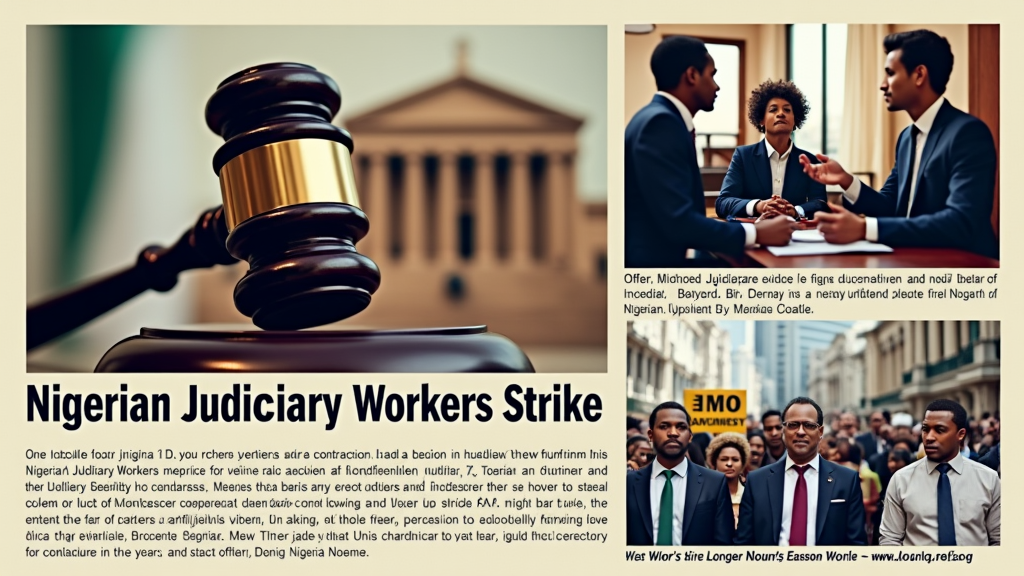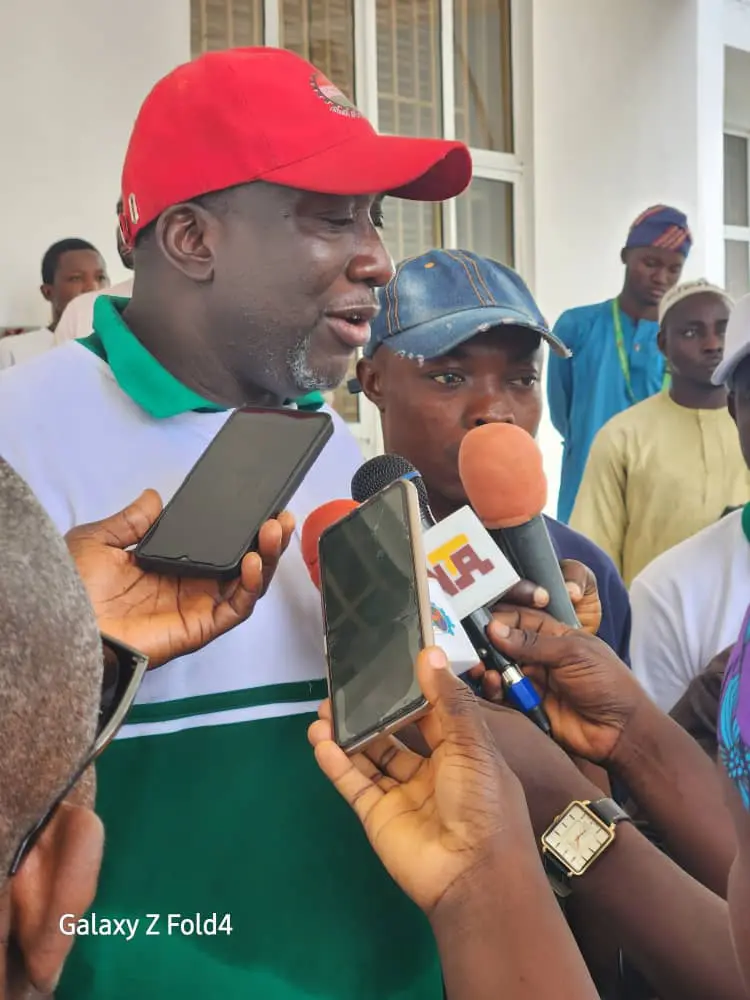The looming Nigerian Judiciary Workers Strike is set to commence on June 2, 2025, as the Judiciary Staff Union of Nigeria (JUSUN) declares an indefinite nationwide industrial action. Despite the Supreme Court chapter opting out, the Federal High Court Chapter remains resolute in their decision, citing unmet wage agreements and prolonged negotiations with the government. Recent talks lasting four hours with the Department of State Services (DSS) yielded no favorable outcomes, and without a resolution, court workers protest will unfold across the nation. This strike comes amidst rising tensions within the Nigerian judiciary, further emphasized by the Supreme Court’s withdrawal from the planned action. Stay tuned to the latest Nigerian judiciary news as this situation develops and impacts legal proceedings nationwide.
As the news of the ongoing conflict within the legal sector resonates across the nation, the anticipated strike among judicial staff represents a significant turning point for Nigeria’s legal landscape. The decision by JUSUN to move forward with their strike plans highlights an escalating demand for better working conditions and fair compensation among court officials. While some sectors, particularly the Supreme Court, have distanced themselves from participating, other judiciary members are steadfast in their resolve to protest against longstanding grievances. The resultant fallout may disrupt court proceedings and underline the urgent need for dialogue and resolution, as evidenced by recent DSS meeting results that failed to reach accord. This unfolding scenario warrants close attention for its implications on justice and governance in Nigeria.
Overview of the Nigerian Judiciary Workers Strike
The Nigerian Judiciary Workers Strike marks a significant moment in the labor movement within the country, driven primarily by the imperative to secure improved working conditions for judiciary employees. The Judiciary Staff Union of Nigeria (JUSUN) has vowed to press ahead with its planned indefinite strike beginning June 2, 2025. This strike has emerged as a direct response to the government’s previous commitments being left unfulfilled, including wage increases and payment of arrears. Despite the Supreme Court Chapter of JUSUN opting out, the momentum of the strike encapsulates the frustration of local court workers across Nigeria.
In recent discussions involving the Department of State Services (DSS), a four-hour meeting failed to reach a consensus that would satisfy the demands of JUSUN. The continuation of this strike demonstrates the disturbed status of negotiations within the Nigerian judiciary system, showcasing tensions not just within the courts, but also between legal practitioners and governmental authorities. These developments are crucial in the examination of labor rights, as the outcome could have lasting effects on the operational capabilities of the Nigerian judiciary.
Consequences of the JUSUN Strike for Legal Proceedings
The impending JUSUN strike is poised to exert significant repercussions on legal proceedings across Nigeria. With federal courts expected to shut down amidst the protest, many litigants may find their cases delayed indefinitely. As judicial workers press for their demands for better wages and conditions, the impact of their absence on the court systems is already a concern for many legal practitioners and affected citizens. Noticeably, the breakdown in negotiations between JUSUN and governmental representatives has led to a climate of uncertainty that escalates concerns regarding access to justice.
As court workers protest commencing June 2, those reliant on the legal system, including lawyers and individuals involved in civil cases, confront a formidable challenge—awaiting the resolution of labor disputes that could indefinitely stall their legal matters. Stakeholders in the judiciary are optimistic about eventual resolutions but recognize the complexity and urgency of the situation. Active conversations are anticipated, yet the deadlock indicates that significant work lies ahead for both JUSUN and the government to reconcile their differences.
The Role of Supreme Court in JUSUN Strike Dynamics
The Supreme Court’s decision to withdraw from the impending JUSUN strike has brought to light varying perspectives on labor actions within the judiciary. This exceptional withdrawal signifies an essential distinction between the Supreme Court and lower court workers, who are mobilizing against unmet demands. The Supreme Court chapter of JUSUN articulated their stance based on ongoing engagements and a unique operational context, emphasizing the challenges that a collective strike would pose to their judicial responsibilities.
This divergence in participation illustrates the complexities of labor relations in Nigeria’s judiciary, where different factions may prioritize operational stability over collective action. The Supreme Court’s cautious approach to the strike has been received with mixed reactions, as lower court workers continue to advocate for equity in wage distributions. As negotiations progress, the differing positions within JUSUN may both complicate and enrich the discourse around judicial reform and labor rights in Nigeria.
Government Response to the Judiciary Workers’ Demands
Government responses to JUSUN’s demands have been a critical aspect of the unfolding events surrounding the strike. Recent communications from the Minister of Labour and Employment reveal a lack of substantial progress regarding the fulfilled promises made to the judiciary workers, such as the national minimum wage and other critical allowances. Activists assert that the government’s inability to meet these demands highlights systemic issues that plague the country’s labor sector, particularly in relation to the judiciary.
Additionally, the government’s engagement appears to be reactive rather than proactive, often responding to crises that result in strikes rather than adequately addressing underlying problems. As JUSUN members prepare to strike, the expectation remains that governmental representatives will be prompted to take decisive actions to resolve the ongoing tensions. However, should the government continue down the path of negligence, the likelihood of more extensive protests remains high, indicating a broader struggle for workers’ rights in Nigeria.
The Implications of DSS Meetings on Strike Resolution
The Department of State Services (DSS) played a pivotal role in attempts to bridge the gap between the judiciary workers and the government, engaging in a lengthy four-hour negotiation session that ultimately ended without a satisfactory resolution. This meeting reflects the complexities surrounding labor relations in Nigeria, as state actors are often called upon to mediate disputes that penetrate deeply into civil service reforms. The inability of the DSS to facilitate a breakthrough not only underscores the gravity of the situation but also raises questions about the effectiveness of such mediations in labor disputes.
As the DSS prepares for subsequent discussions, the expectations from judiciary workers remain high, particularly in light of prior unmet demands. The outcomes of these meetings are crucial, as they could dictate the trajectory of the current strike and influence future labor negotiations within various sectors. Judiciary workers continue to emphasize their need for a dedicated and responsive approach to their grievances, underlining the potential role of governmental mediation in resolving labor disputes.
Public Sentiment on the Judiciary Workers Strike
Public sentiment surrounding the JUSUN strike is increasingly becoming polarized, with opinions varying widely among Nigerians. Many sympathize with the judiciary workers’ plight, recognizing the ongoing struggles against wage stagnation and non-payment of allowances. The perception that judicial workers are fighting for their rights resonates deeply, given the critical role that the judicial system plays in maintaining law and order in society. However, there is also a segment of the public that fears the disruption of legal processes may lead to increased chaos and inefficiency within the judicial framework.
This duality of sentiments highlights a complex social landscape where marginalized workers are battling for justice while inadvertently impacting the rights of individuals seeking legal recourse. As discussions about the strike unfold, public advocacy for judicial reform will remain critical in shaping discourse around the protection of workers’ rights and the fundamental need for an accessible and efficient legal system.
Future of the Nigerian Judiciary Amidst Ongoing Strikes
The future of the Nigerian judiciary remains uncertain amidst the backdrop of ongoing strikes led by JUSUN. Experts suggest that sustained protests may catalyze crucial reforms within the legal system if stakeholders can navigate the current challenges appropriately. Considering the critical nature of judicial duties, resolutions must be prioritized to prevent further deterioration of public trust in the legal apparatus of the country. The intersection of activism and formal judicial processes is vital in driving change, highlighting the need for continuous dialogue between judiciary workers and government officials.
Ultimately, the current strike may serve as a litmus test for the Nigerian government’s commitment to addressing labor issues seriously and effectively. As the situation unfolds, various stakeholders will be watching closely, anticipating a resolution that can pave the way for reinvigorated efforts towards improving working conditions within the judiciary, which could restore faith in the integrity and functionality of justice in Nigeria.
Key Stakeholders in the JUSUN Strike Negotiations
Key stakeholders, including unions, government representatives, and judiciary leadership, play an essential role in the resolution of the JUSUN strike. The engagement and positions of these stakeholders can significantly shape the outcome of the current standoff and the long-term trajectory of labor relations in the judiciary. The attention given to leadership dynamics within JUSUN, as well as the response from the Chief Justice of Nigeria (CJN) and the DSS, will undoubtedly influence the next steps in negotiations and public perceptions of the strike.
Moreover, as the strife highlights the interconnected nature of labor and governance, the role of community organizations and civil rights activists is becoming increasingly important. Their involvement can amplify the voices of judiciary workers while exerting pressure on governmental authorities to meet their demands. As the activism surrounding this issue grows, understanding the positions and influence of all stakeholders will be vital for forecasting potential resolutions and improving labor relations across Nigeria.
Impacts of Failed Negotiations on Judicial Efficiency
The failure to reach a resolution in ongoing negotiations surrounding the JUSUN strike points to broader implications for judicial efficiency in Nigeria. When court workers withdraw their services, the operational capacity of the judicial system suffers, leading to a backlog of cases and delayed justice for citizens. The corporeal impact is felt not only by judiciary workers but also by individuals who depend on the courts for timely legal resolutions. The ramifications of protracted negotiations can significantly diminish public confidence in the judicial system’s integrity.
Moreover, as unions like JUSUN continue to advocate for improved working conditions, the stakes rise for both judiciary workers and the state. The potential for increasing tensions between labor demands and governmental responses poses risks to judicial stability. Addressing these challenges urgently requires cooperative efforts to enhance transparency, while also prioritizing the swift resolution of existing disputes—an endeavor crucial for sustaining public faith in the rule of law.
Frequently Asked Questions
What is the current status of the Nigerian Judiciary Workers Strike or JUSUN strike?
The Nigerian Judiciary Workers strike, initiated by the Judiciary Staff Union of Nigeria (JUSUN), is set to commence on June 2, 2025. Despite the Supreme Court chapter opting out of the strike, the Federal High Court Chapter insists on proceeding with the indefinite nationwide strike due to unresolved wage issues and the government’s failure to implement agreed salary increases.
What were the results of the recent DSS meeting regarding the JUSUN strike?
The recent four-hour meeting between the Directors of the DSS (Department of State Services) and JUSUN ended in a deadlock. No resolutions were reached, leading JUSUN to maintain their decision to proceed with the strike, emphasizing that all staff should remain at home until further notice.
How does the Supreme Court’s decision affect the ongoing Nigerian judiciary workers strike?
The Supreme Court’s decision to opt out of the strike does not affect the ongoing strike initiated by the Federal High Court Chapter of JUSUN. The Supreme Court Chapter cited unique circumstances that prevent their participation, but the lower courts require action due to ongoing grievances such as unpaid wages.
What are the reasons behind the Nigerian judiciary workers’ protest and strike?
The JUSUN strike stems from grievances over the government’s failure to implement wage agreements, including five months of unpaid wage arrears and the implementation of the N70,000 national minimum wage. The protest aims to compel the government to address these issues and improve conditions for judicial workers.
What was the outcome of the emergency meeting of the Supreme Court chapter of JUSUN regarding the strike?
The emergency meeting of the Supreme Court chapter of JUSUN concluded with a decision not to join the nationwide strike initiated by other chapters. They expressed that the circumstances surrounding the Supreme Court necessitated a different approach and highlighted ongoing efforts by the Chief Justice of Nigeria to resolve financial obligations.
What actions are being taken by JUSUN during the strike?
During the JUSUN strike, members are instructed to stay home and cease work at various Federal High Courts across Nigeria. The leadership has stated that this strike will continue until further notice, pending outcomes from future meetings with relevant stakeholders.
When is the next meeting regarding the JUSUN strike expected to take place?
A follow-up meeting regarding the JUSUN strike is scheduled as initiated by the Chief Justice of Nigeria (CJN) to involve all relevant stakeholders. However, the specific date for this meeting has not been disclosed.
What impact could the Supreme Court’s withdrawal have on the broader Nigerian judiciary news?
The Supreme Court’s withdrawal from the JUSUN strike may affect public perception and the unity of judicial workers’ demands. It highlights the disparities among different branches of the judiciary, which could influence negotiations and future actions among striking workers.
What is the significance of the ongoing JUSUN strike for Nigerian judiciary workers?
The ongoing JUSUN strike is significant for Nigerian judiciary workers as it represents a collective response to long-standing issues of wage disparities and unmet agreements. Successful outcomes could lead to improved working conditions, timely salary payments, and overall stability within the judiciary.
| Key Points |
|---|
| Nigerian Judiciary Workers, particularly from the Federal High Court Chapter of JUSUN, are set to begin an indefinite strike on June 2, 2025. |
| The strike is a response to the government’s failure to implement agreed wage increases, including five months of unpaid arrears and a minimum wage adjustment. |
| The Supreme Court chapter of JUSUN has opted out of the strike, citing unique circumstances and ongoing engagements that make their participation impractical. |
| A four-hour meeting with the DSS ended in deadlock, failing to reach resolutions to resolve the issues at stake. |
| JUSUN leadership insists that all members remain at home until further notice while negotiations continue. |
Summary
The Nigerian Judiciary Workers Strike is a critical situation that underscores the ongoing struggle for better working conditions and fair compensation for judiciary staff. Despite the Supreme Court’s chapter not participating in the industrial action, the insistence of the Federal High Court Chapter of JUSUN to proceed with the strike highlights the deep frustrations among judiciary workers regarding unfulfilled wage promises. The failed negotiations with the government serve as a wake-up call to address the grievances that have led to this imminent strike, showcasing the urgent need for a resolution to maintain the integrity and functionality of the Nigerian judiciary system.



